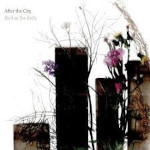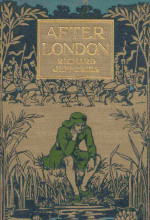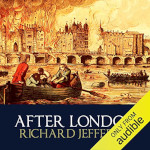A post-apocalyptic planet has perhaps rarely felt less far-fetched than it does right now. The idea of cities and people being overthrown by disaster and disease and nature returning as victor seems less the stuff of sci-fi in these surreal times. This year the ever-intriguing Brighton band Bird in the Belly met the theme full on, creating their third studio album After the City – rich with their trademark ‘folk noir’.
The journey of this mesmeric quartet began in 2018 when they trawled folk archives for little known songs and long forgotten lyrics and revitalised them in The Crowing, which was named the Sunday Express’s 5* Album of the Year. A year later their already finely honed act gained widespread critical acclaim for sophomore album Neighbours & Sisters – fascinating dark songs that seemed to slide straight out of grimy Georgian and Victorian underworlds.
Bird in the Belly comprises Laura Ward and Adam Ronchetti of duo Hickory Signals together with Ben ‘Jinnwoo’ Webb and multi-instrumentalist Tom Pryor who slickly produces this new release. Gravel-edged and gutteral, Webb’s uncanny vocal often floors first-time listeners. Here it fuses with the unadorned but strong, crystal clear voice of Ward – linchpins in this compelling line-up.
Ward further defines the band sound with her exquisite flute playing while Ronchetti plays acoustic guitar, bodhran, bass pedal and additional percussion and multi-instrumentalist Pryor effortlessly plays no less than six instruments - violin, guitar, organ, piano, bass pedal, synth and banjo as well as contributing backing vocals.
Recorded at Studio 95 in Brighton, After the City emerges as an uneasy, restless concept album – and one that might never have been made. On tour to showcase Neighbours & Sisters in March 2020 they were watching the ever-escalating COVID news and wondering if their upcoming Ireland tour would be able to go ahead. It swiftly became clear the answer was ‘No’. Says Laura: “We went home to Brighton and, within weeks, a whole year’s worth of tour dates had been cancelled and the country was in lockdown.”

Known for their songs of social relevance, meticulous research and unearthing of dusty poems, texts and overlooked songs, the band alighted on an apt 19th century book – nature writer Richard Jefferies’ After London – described as ‘an early example of post-apocalyptic fiction.’ Also known as Wild England, it tells the story of the country reverting to nature following an unspecified catastrophe – and the last few surviving humans experiencing vast change in depopulated towns and cities. Cats and dogs have turned feral and festering bodies have been left to rot under a large lake that sits where London used to be. But now the sea is so clean, it’s pure enough to drink.
By turns earthy and ethereal, strident and scaring, this is something of a futuristic musical odyssey – taking listeners from urban bustle to wholescale destruction and witnessing the healing powers of nature. Says Ben: “Jefferies doesn’t detail what preceded the end of the fictional England so we turned our attention to cotton famine poetry, plague poetry and broadside ballads to construct a back story.”
Jefferies’ novel was an apt choice for the Brighton band. A one-time reporter for Wiltshire newspapers, Jefferies once lived in the city. His third child was born in Brighton in 1883 but died two years later from meningitis. Jefferies’ final home was at nearby Goring-by-Sea. He suffered from tuberculosis and died in 1887 aged just 38 and is buried along the coast at Worthing’s Broadwater Cemetery.
Bird in the Belly know just how to create atmosphere. Cinematic, dramatic and beautifully crafted the 10-track album intrigues, beguiles and disturbs in equal measure. The opening song Tragic Hearts of Towns conjures the image of a lively, bustling metropolis, set against a merry medieval-style melody. It is adapted from Alexander Smith’s 19th century poem Glasgow – depicting an out-and-out urban scene where the only nature on show are the flowers on his window sill. You might feel Webb and Ward’s vastly differing vocals shouldn’t work but they blend tightly and seamlessly, driving the song along.
But the lightness is short-lived with the next four songs bringing the biblical Horsemen of the Apocalypse to the party – harbingers of Plague, War, Famine and Death. Marking the arrival of the White Horse, Litany is a sobering, plaintive and spiritual song – Webb and Ward eerily repeating the lyric ‘I am sick and I must die’ against soaring violin. It is adapted from Thomas Nashe’s Elizabethan play Summer’s Last Will and Testament (1600). Written during an outbreak of Bubonic Plague, the drama contained a poem that acquired independent fame - A Litany in Time of Plague.

The arresting Jemmy is Slain – a broadside ballad from the Bodleian Ballad Library - acknowledges the Red Horse and the advent of war and combat. Stark vocals against minimal instrumentation build to a percussive, dark and moving soundscape where Webb and Ward’s voices sing in counterpoint and instruments ‘wail’ in an epic, expansive lament. An ominous humming opens Famine, Fever, Frost (the words taken from Exeter University’s Lancashire Cotton Famine Poetry Archive.) Ward’s captivating voice and the repeating haunting melody, akin to bells tolling, create a hypnotic atmosphere, signalling the arrival of the Black Horse.
Forbidding flute opens Pale Horse – as the fourth horseman brings Death in its wake. Ward and Webb deliver the solemn ‘end game’ message with lyrics “Doctors raving and disputing/Death’s pale army still recruiting.” An exceptional track, it builds in tension with a percussive hoof beat rhythm, the haunting feel accentuated by bodhran and wailing e-bow.

The Horsemen have left their mark on the once buzzing city and the next track evokes a landscape of Smokeless Chimneys. A stark and striking acapella setting brings to life another poem from the time of the Lancashire Cotton Famine (1861-5), attributed to “a Lancashire lady in aid of the Relief Fund.” The severe depression in the textile industry has stopped the constant curls of smoke from the mill chimneys bringing debt and starvation to the workers but a passer-by observes “How much prettier is this country?” ignorant of the devastating effect it is having on thousands of families.
The unspecified event that finally destroys England is illustrated with Pryor’s suspenseful instrumental interlude Landmark leaving the listener to make up their own mind about the nature of the catastrophe. The final three tracks of the album - which the band have skilfully adapted from Jefferies’ book - bring relief from the angst as the mood turns to optimism.
After London, essentially the title track, starts by depicting the decay but merges into the rewilding of the country. The instrumentation is more calm and soothing; the vocals more upbeat and hopeful - as shoots of green sprout up and the threat evaporates in ebbing and flowing flute and gentle percussion. The lyrics reveal: “After London ended everything was green, like sunshine breaking through”.
Lay Low Lay with Laura on lead vocal trips along optimistically and sees Nature triumph, with the emphatic, lilting chorus “London won’t wake” before the confident, carefree The Ships closes the album, the driving guitar rhythms and blithe flute striking notes of hope. Cerebral and classy, After the City totally encapsulates the term ‘other worldly’. As beguiling as it is disturbing, the end result is another startling, theatrical album from a discerning, uncompromising collective who continue to be a revelation.
Photo Credits:
(1)-(2) Bird in the Belly,
(3)-(4) Richard Jefferies
'After London'
(unknown/website).